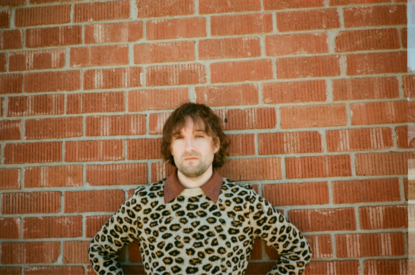Out Through the In Door: The Psychic Temple Must Come Down
by Hobey Echlin
“I’m contrarian by nature,” admits Chris Schlarb.
The Long Beach, CA-born-and-raised producer/composer/guitarist has spent his quietly accomplished career embracing a wilful obscurity that has, despite his best efforts, won him his share of accolades, even more impressively, for thrillingly different things. His debut solo album, Twilight & Ghost Stories, was lauded as “40 minutes of avant-garde bliss” by the New York Observer. That was followed by Interoceans from his experimental noise duo I Heart Lung, named by National Public Radio as one of the Top 5 Jazz albums of 2008. And then there was his spare, architectural guitar compositions for the video game NightSky a year later, which earned him a nomination for the Independent Game Festival’s Seumas McNally Grand Prize.
Now with Psychic Temple II, 39 minutes of tightly-composed but still loosely-fitting Americana, jazz and dronescapes, Schlarb is making his most ambitious statement yet, refining his all-embracing palette of sound into his most economical, accessible work yet.
“I’ve been ‘out.’ I wanted to come in,” says Chris.
On PTII, he flips the script(s) altogether, delivering 11 finely-honed compositions – about half clocking in at less than three minutes. “I felt like it would be a huge challenge for me to do in three minutes what used to take me ten,” he says.
A challenge, sure, but also an opportunity. There’s a vitality, an organicness, to Schlarb’s compositions that are both undeniable and resonant. The opening “Seventh House,” breathes itself to life as a waking waltz for vocalist Sarah Negahdari’s swooning enunciations of “It’s a long way down/To the Seventh House,” as the the track evolves from a bruised blues to an almost creepy mission statement: “The Psychic Temple walls come down.” That’s followed by “The Starry King Hears Laughter,” a jazz exercise in less-is-more, propelled by the dual/duel drums of Tabor Allen and Andrew Pompey and trumpeter Kris Tiner’s clear, concise phrasing. “I was sort of inspired by those jazz-pop crossovers, like ‘Take Five,” Chris says. “I mean, to be honest, I don’t particularly like ‘Take Five,’ but there was a time when jazz was pop music.”
It’s this economy, if you will, of pop, that fascinates Schlarb. Pop is still a forbidding, strange term to a contrarian, and in his own listening, Chris says he’s been drawn to the fringe pop of more-out-than-in musicians like Buggles mastermind Trevor Horn and Thomas Dolby, admiring their refined, if skewed, songwriting. “I read a great interview Trevor Horn talking about the Buggles, and he said, ‘A great song should have five ideas,’” he says, and then offers an example: “I listen to Tears for Fears ‘Head Over Heels,’ and there’s this A-9th-C-augmented thing going on in the harmony – it’s not just lowest common denominator.”
Likewise, PTII shows Schlarb’s own invigorated appreciation of songwriting – beginning with the glowing-embers cover of Brian Wilson’s Beach Boy swansong “’Til I Die”. The product of hotel room pop-up studio session with Raymond Byron Raposa, Sufjan Stevens, and Nedelle Torrisi that came together as miraculously as they did meticulously.
“I’ve known Ray from the Castanets and we were both big fans of ‘Til I Die,’ because it was one of the last songs Brian wrote for the Beach Boys,” Chris explains. “Ray sang in this falsetto and by the second or third take, his phrasing really fell into place and I knew we had it. It’s like you know Brian Wilson as this pop culture character, but when you get into a song like that, you understand how he got there.”
There’s also a halftime reading of Joe Jackson’s “Steppin’ Out” that nobody may have asked for but that anyone can appreciate, due in no small part to vocalist Aaron Roche’s tender, elegant rendition of Jackson’s lyrics (“You dress in pink and blue just like a child/And in a yellow taxi turn to me and smile” never sounded so quietly majestic). And, it must be noted, an outta nowhere bass solo from Steuart Liebig. Explains Chris, “I heard a live version of ‘Another World’ with an impromptu Graham Maby bass solo. After the song, Joe Jackson says he normally doesn’t like bass solos, so I had to put one in.” (Likewise, his solemn rendition of Frank Zappa’s “Sofa No. 2” is so reverent-with-a-capital-’R’ with its fiddle, acoustic guitar and trombone/alto sax/bass clarinet arrangement, it could both score a Ken Burns documentary and earn props from jazz heads).
The inclusion of covers on the album echo the good-karma connections of Chris’ supporters/collaborators here. Besides Asthmatic Kitty founder Stevens singing on “‘Til I Die,” Schlarb’s teenage guitar hero Paul Masvidal (Cynic/Death), contributes the titular acoustic solo of “Solo In Place,” and duets on the tender guitar meditation “NO TSURAI,” the longest track on the album you still don’t want to end. Talking about working with Masvidal can still get him choked up. “I mean, here’s this guy whose music got me through high school and I’m sitting across the room from him playing guitar?” he asks incredulously.
But the covers and good-karma also reflect the more accessible spirit of the album in general, a reflection, he says, of his family life – its challenges and it’s comfort.
“Music’s the antidote to the day-to-day of helping with homework, going to work, but it’s also because of my wife and kids that I have this support and have this place in my life for music. I don’t have the luxury to go off and make a record for a month. I have weave it in and out of family life,” says Chris.
Or, make it part of family life, as heard in the now-annual Schlarb family holiday tradition of releasing big-hearted musical holiday cards of Steely Dan and Fleetwood Mac covers over the last two years. “I never had much interest in playing anybody else’s music,” Schlarb admits. “But we had so much fun doing it, it changed my mind.”
Not uncoincidentally, the album has also occasioned Schlarb’s own finest songwriting to date. “Bird In the Garden” is the album’s perfect song, a tentative, gently loping heartswell of longing and discovery in vocalist DM Sith’s hushed, tense performance.
“Music’s the antidote to the day-to-day of helping with homework, going to work, but it’s also because of my wife and kids that I have this support and have this place in my life for music.”
I never know/When you will come/You’re my bird in the garden/I saw you fly/Behind the sun/You’re my bird in the garden/Oh but the daylight never ends/Oh but the darkness keeps me in/And so I pray/Waiting for your pardon/You’re my bird in the garden.
“It’s probably one of the most deceiving songs on the album,” Chris says of the song, which he calls his “country song with weird little turnaround C-major-thirteen-sharp-11th,” over and done in under three minutes. “It’s wrapped in a sweetness that is really dystopian – the bird watcher slowly realizes he’s actually the one being watched.”
It’s within these self-imposed, impossibly tight structures, that Schlarb show his compositions as labored as the playing on them is inspired. Take the closing “Hyacinth Thrash Quarter,” two minutes (!) of odd-time funk (three bars of seven and a single bar of four) that would make Bill Bruford blush. “I came up with it and realized just because it was funky didn’t make it a song. I mean, seven years ago, I would have just been done with it. It took me forever to write the horn arrangements. Then I realized I had room for four solos in the four bars at the end of the 25, so it started to feel like a ‘90s hip-hop posse cut. I think I wound up making my own demented version of ‘Scenario.’”
But where the tracks themselves speak to the, take your pick, talent/persistence/vision/kismet/miracle of a career spent furthering his craft on his own terms, Psychic Temple II is a record that feels as timely as it does timeless. “My biggest issue was in how to put together the tracklisting. I didn’t want it to be one side is jazz and the other is vocals, like dictating how it should be listened to. I wanted it to have this unifying vision. That’s probably what I’m most proud of, how unadulterated it is. You can’t hear it and be like, ‘Oh, he was listening to this.’”
There’s also a palpable confidence here; “the psychic temple” of experimental obscurity has indeed come down. “I learn at different stages,” Chris says. “I love the experimental side of things but when it stays there, there’s no context. With this record, I challenged myself, and honestly, set myself up for a lot of potential to fail. I had no pressure. I get asked sometimes which college or conservatory I went to. Man, I barely got out of high school. I just want to get better.”
Let's Stay Connected
Get updates on the latest Asthmatic Kitty releases.


